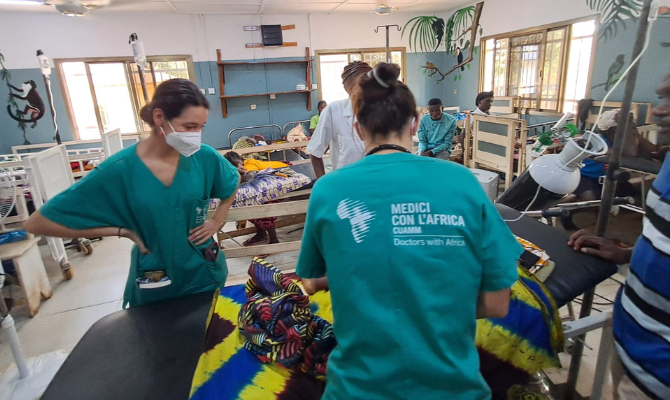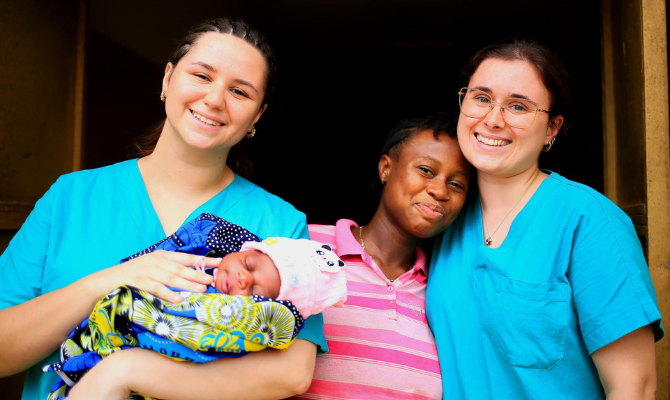Gratitude: that’s the word Maria Corina Virtuoso, a civil service nurse in Pujehun, Sierra Leone, carries with her after a year of fieldwork. Gratitude for the small things, for all the work done – and most of all, for the team effort. A mix that, despite the scarcity of tools and resources, makes it possible to achieve a lot. In some cases, even miracles. That’s what Maria tells us. For International Nurses Day, we asked her what this job means to her and what she has learned from doing it with Cuamm, in Africa:
«Being a nurse here means giving yourself completely. I divide my time between the pediatric ward and intensive care, but I also help out in the neonatal unit and in the malnutrition ward. Basically, we try to be everywhere, to be as useful as possible, to reinvent ourselves in every way. Here, we are nurses, but when needed, we are also pharmacists, cleaning staff—everything. Every single person here truly plays a fundamental role».
Maria has been in Pujehun for almost a year. She arrived last July and will leave at the end of this month. It’s impossible, she says, to ever be truly prepared. You can collect countless stories before departure, you can think you have a good idea of what awaits you, but the truth is: you’re never ready. There are many dramatic situations, compounded by extremely high child mortality and illnesses that are uncommon in Italy. But nursing also allows for the building of beautiful relationships with patients and their families—a closeness that warms the heart, especially when witnessing stories of recovery.
«We see many severely ill children. Besides malaria and tuberculosis, many of them arrive with serious burns. A lot of these cases come from a nearby village called Sahn Malen, where palm oil is produced. This means parents are out working all day, and the children often stay home alone and get burned on the open fires where the oil is prepared. At first, I’m the ‘bad one’ to them, of course—the dressings are very painful. But once they start healing, a beautiful relationship forms, both with the children and their parents. Seeing them get better, running and playing in the ward, fills my heart with gratitude».
In Sierra Leone, Maria says, being a nurse means constantly battling with a lack of resources. Even though so much can be achieved with so little, sometimes it still isn’t enough—and that brings frustration and sadness. But it’s also a source of growth, both professionally and personally:
«My experience with Cuamm helped me get to know myself and my strengths better. In Pujehun, I discovered that I am both more fragile and braver than I thought. Feeling like you are making a real contribution in such an isolated context gives you a strong sense of purpose, because every bit of help truly matters. I think of the story of Ibrahim, an 18-month-old boy who arrived in an incredibly desperate condition. He was in a coma with severe cerebral malaria, and on top of that, he was HIV-positive and had been poisoned. That’s another issue: villages are often far from the hospital, and parents try everything before deciding to travel or pay for transport. So they turn to traditional medicine, and many children arrive here poisoned by the herbs used. That was Ibrahim’s case. If it hadn’t been for an extraordinary team effort, we wouldn’t have been able to save him. We all pitched in, including the physiotherapist, and with a lot of care, he eventually came out of the coma. He was reborn. That’s the greatest miracle I’ve ever witnessed».
Maria keeps a tender photo of herself with Ibrahim — one piece of a growing puzzle she builds day by day, capturing the joy of children and mothers at the moment of hospital discharge. A way to remember not the illness or the suffering, but the rebirth that shines in the eyes of those returning home. A rebirth made possible by the tireless work of the entire healthcare team and the dedication of nurses like her.









